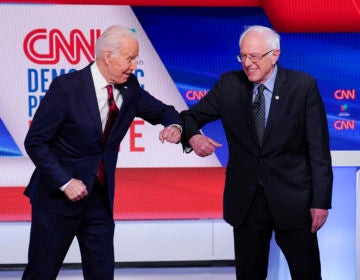It’s Bernie 2.0: More professional, more personal this time
A young civil rights activist named Bernard Sanders was arrested and dragged off to jail for protesting school segregation on the South Side of Chicago in the summer of 1963.

Sen. Bernie Sanders, I-Vt., speaks about his new book, 'Where We Go From Here: Two Years in the Resistance', at a George Washington University/Politics and Prose event in November 2018. He announced a second presidential campaign on Tuesday. (Alex Brandon/AP)
A young civil rights activist named Bernard Sanders was arrested and dragged off to jail for protesting school segregation on the South Side of Chicago in the summer of 1963.
Most voters didn’t learn about that episode until photos surfaced in late February 2016, almost 10 months into the Vermont senator’s first presidential campaign. Sanders had been struggling to win over African-American voters, but his topsy-turvy campaign team didn’t know such powerful evidence of his civil rights bona fides existed until five days before South Carolina’s primary.
Sanders lost the Southern contest, which is heavily influenced by the black vote, by almost 50 points.
As he launches his second presidential campaign this weekend, Sanders and his team are determined not to repeat the same mistake. The 77-year-old self-described democratic socialist will hold high-profile rallies in Brooklyn and Chicago, where he’ll open up about his working-class roots and early activism — including the arrest — as he tries to prove he’s learned from his 2016 stumbles.
“What is different of course this time is we’re built to win and planning to win from the very beginning,” said Faiz Shakir, Sanders’ campaign manager, who last week became the first Muslim hired to lead a major U.S. presidential effort.
Welcome to Bernie 2.0, a more professional campaign based in Washington with a team that is embracing a more personal message, a more diverse staff and a much more organized nationwide operation. It’s all backed by the strongest fundraising operation in the 2020 Democratic field.
For this candidate, more than others, the new approach has risks.
Turning to a more typical presidential campaign, including an appealing personal story, could help in some areas. But it also could threaten to alienate voters who have been drawn to Sanders’ aggressive policies and no-frills speeches. And while he won over millions of Democrats three years ago as the unpolished anti-establishment alternative to Hillary Clinton, he faces a much more complicated and crowded path to the nomination in 2020.
But as the only repeat candidate, Sanders joins the 2020 Democratic field not an outlier, but a front-runner.
The decision to shift his headquarters from Vermont to Washington, Shakir said, “is the sign of a confident candidate that’s just like, ‘Hey, we’re going to base this where it’s functionally attractive for me to be based. I’m not trying to play politics with this.'”
Shakir and a team that features women and minorities in at least five senior roles so far replaces an overwhelmingly white, male team previously led by former campaign manager Jeff Weaver, who will stay on as a senior adviser.
Sanders parted ways with three longtime media consultants who cited “creative differences” in deciding to leave the campaign.
To address past concerns about sexual harassment and pay inequity, the new campaign will feature mandatory training highlighting an independent phone line to report issues and a fixed pay scale for virtually every position. By the end of the next week, the campaign expects to have roughly 35 people on the payroll, Shakir said. By comparison, Sanders’ campaign had only around two dozen people on the payroll in June 2015.
Weaver said Sanders’ proven ability to raise money allows his second presidential campaign to be much more organized and deliberate with its resources.
Beyond Washington, they’re actively assembling paid teams in the first states on the primary calendar: Iowa, New Hampshire, South Carolina and Nevada — in addition to California, where the team plans to compete aggressively against home state Sen. Kamala Harris.
“We don’t talk about the first four states, we talk about the first five,” Weaver said, noting that Sanders is in the process of scheduling a California rally.
Sanders can afford to be aggressive.
He has dwarfed his early competition in fundraising so far, raking in roughly $10 million in his first week as an announced candidate.
That gives him the time and resources to try new approaches, including talking about himself more often.
In 2016, Sanders was laser-focused on liberal policies to address income inequality in his first run, barely mentioning his own personal story.
But in Saturday’s appearance in Brooklyn, the borough where he was born and developed the thick accent he carries today, Sanders plans to open up about life in a rent-controlled apartment and the values instilled by a family led by Polish immigrants who came to America to escape the Holocaust, Shakir said. The personal focus is intended to create a direct contrast with President Donald Trump, who also grew up in New York, but was raised in wealth.
In Chicago on Sunday, Sanders will highlight his early work in the civil rights movement, including the 1963 arrest, his fight against police brutality and his participation in Martin Luther King Jr.’s march on Washington.
South Carolina State Rep. Terry Alexander, a Sanders supporter who saw first-hand his struggle with black voters in 2016, cheers the plan to open up.
“I think he’s a little shy, doesn’t want to toot his own horn, but I think it’s a good story to tell and he should tell it at every chance he gets,” Alexander said. “Not arrogantly, but to share some of the issues and concerns, particularly when he’s trying to engage the African-American vote, and those people who are sympathetic to the African-American vote as well.”
Nina Turner, a former Ohio state senator who is now a co-chair of Sanders’ campaign, said a more personal message would strengthen his standing among voters of all ages and races.
“I remember in 2016, I was really trying to push him to talk about himself more,” Turner said.
In his younger days, she said, “he actually was doing what a lot of the young people are doing today.”
“If I look at the Parkland students, the Black Lives Matter movement, he was the same page as them. So, he can connect with the elders, but he also by telling his story can connect with today’s millennials. He was today’s millennials back then.”
Even with all the changes to the campaign, Shakir insists Sanders won’t allow his team to fundamentally change who he is — or his appearance.
“An easy way to get him to get frustrated or annoyed with you is to tell him, ‘This is what you should wear and this is the way you comb your hair,'” Shakir said. “No, he’s going to be Bernie Sanders. And quite frankly it’s not something I’d be interested in touching or any of us want to change because he’s been quite successful being him.”
WHYY is your source for fact-based, in-depth journalism and information. As a nonprofit organization, we rely on financial support from readers like you. Please give today.



